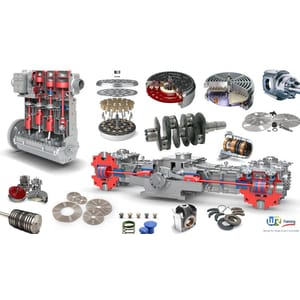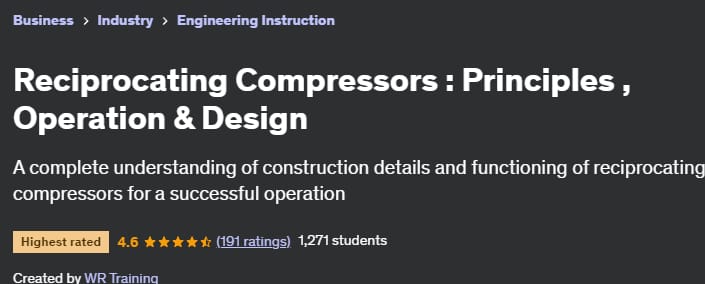
Description
Reciprocating Compressors: Principles, Operation & Design, a training course to fully understand the details of construction and operation of reciprocating compressors for a successful operation is published by Udemy Academy. Nowadays, alternating current compressors with different designs and applications are used in refining, petrochemical and processing industries, as well as in electricity generation and environmental engineering. This course is designed to provide you with a thorough understanding of the details of construction and operation of reciprocating compressors. This understanding is a prerequisite for successful operation of your plant and piping system.
This course includes extensive graphics, 3D animations and cross-sectional views to give you a virtual hands-on view of reciprocating compressors. The purpose of this course is threefold: 1. Divide all reciprocating compressor operational principles into digestible concepts such as gas compression, capacity control, pulse control, compressor lubrication and cooling, etc. 2. Showing through 3D animations and cross-sectional views of the mechanical components of the main compressor, expressing their performance and functional limitations such as bearings, packings, cylinder heads, pistons, valves, etc. 3. Providing instructions and best practices for operation, maintenance and troubleshooting of reciprocating compressors according to API 618 standard
What you will learn
- Understand the working principles of reciprocating compressors for the successful operation of your plant and piping system.
- Understand the manufacturing details of reciprocating compressors (crankshafts, bearings, cylinder heads, connecting rods, pistons, packings, rings, valves, chutes, etc.) for successful repair and troubleshooting.
- Performing various calculations to measure and evaluate compressor performance (head, discharge temperature, input capacity, piston displacement, volumetric efficiency, etc.)
- Understand what influences the selection and design of reciprocating compressors (process conditions, gas characteristics, basic requirements, power supply, interference, altitude, etc.)
- Know how you can adjust the capacity of your compressor using different techniques (inlet valve discharge, empty chamber, variable volume valve, 5-stage control, etc.) with the required changes of your system.
- Understand the concept of pulse, how it affects compressor performance and how to control it according to the API 618 standard.
Who is this course suitable for?
- Mechanical, process and chemical engineers
- Product engineers and technicians
- Specialists in operations, technical services and maintenance
- Engineers, consultants and sales professionals
Reciprocating Compressors Course Specifications: Principles, Operation & Design
- Publisher: Udemy
- teacher : WR Training
- English language
- Education level: all levels
- Number of courses: 100
- Training duration: 5 hours and 21 minutes
Head of the course chapters on 2023-11
Course prerequisites
- Some engineering or field knowledge is preferable but not mandatory. All the concepts are explained in depth using an easy to understand language to allow students to build their knowledge from the ground up
- Having attended our “Centrifugal Compressors: Principles, Operation & Design” training course is a plus but not mandatory
- Having attended our “Understand & Predict Your Centrifugal Compressor Performance & Behavior” training course is a plus but not mandatory
Pictures

Sample video
Installation guide
After Extract, view with your favorite Player.
English subtitle
Quality: 720p
download link
File(s) password: www.downloadly.ir
Size
1.79 GB
Be the first to comment